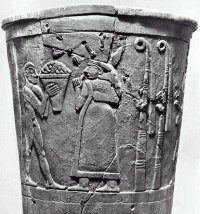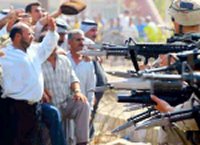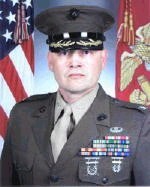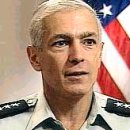Art Pottery, Politics and Food
Friday, June 20, 2003
While waiting this morning in a long Friday bank line I had the opportunity to overhear a conversation between a good old boy and a female acquaintance. Both people were in their early to mid 50s.

The good old boy says, “Well, wha’cha think about what’s going on over there in…in Eye-rack?”
The lady replies, “No, why has something happened?”
“Well, they’re payin’ ‘em $250 for every soldier they kill” says the old boy.
“To kill our soldiers?” the lady asks.
“Yeah,” says old boy, “You know they had me all over, Korea, Panama, Beirut, the Philippines and it just don’t damn work. One of our boys gets killed every day.”
The lady says, “I got a nephew that graduated and just joined the Navy. He leaves in August.”
“Good for him,” says old boy, “I got a grandson just getting back and another leaving.”
“Yeah,” says the lady, “I got a grandson just getting back, too.”
“You know,” the old guy says, “This stuff’s gotta stop. We gotta stop being the world’s policeman and let somebody else handle it. No body in the world appreciates it. I’m sick of our kids getting killed for nothing.”
Very telling, I thought. Everyone in the bank line was casually listening in to this conversation. Sometimes it seems as if every family here in northern Kentucky has a young one serving in the United States military. The current national arguments over WMD and intelligence failures, unlike so many other national issues, have a particular resonance these days here in the Bluegrass state.
A front page story in this morning’s Washington Post says, “U.S. troops in volatile central Iraq say they are growing frustrated and disillusioned with their role as postwar peacekeepers,” and concludes with this illustration of mission impossibility sensed by the blue-collar worker in the bank line:
Even relatively simple projects designed to show goodwill can turn sour. Military engineers recently cleared garbage from a field in Fallujah, resurfaced it with dirt and put up goal posts to create an instant soccer field.
A day later, the goal posts were stolen and all the dirt had been scraped from the field. Garbage began to pile up again. "Is this animosity, crime or both? What kind of people loot dirt?" said Capt. Allen Vaught, from the 490th Civil Affairs Battalion. "We can't build stuff and then have everyone just help themselves.”

According to the New York Times, FCC Chairman Michael Powell’s career plans suffered a major setback yesterday as the United States Senate, moving with astonishing speed, began the process of reversing the highly controversial Powell rules recently enacted, despite tremendous public opposition, by the Federal Communications Commission:
A broadly bipartisan group of the Senate Commerce Committee approved legislation by voice vote to restore the earlier limits on the number of television stations a network can own. The bill would also restore most of the restrictions that have long prevented a company from owning both a newspaper and a radio station or television station in the same city.
A provision within the Senate bill would also force a number of radio groups, including Clear Channel, which dominates the Cincinnati radio market, to divest themselves of some radio properties.
This morning’s column by Washington Post media critic Tom Shales:
It didn't help Powell's cause that he tried to railroad his changes through in a cavalier way, one seen as contemptuous of public opinion and, for that matter, of the whole regulatory process. "It's the most significant defeat that the biggest media companies have had in a long, long time, no thanks to Mr. Powell," said Jeff Chester, executive director of the Center for Digital Democracy, yesterday afternoon…Schwartzman [Andrew Jay, president of the Media Access Project] said Powell has been "very discredited" by this major defeat. His chairmanship of the FCC has largely been a disaster, at least where public interest is concerned. The committee's vote could also put a large stumbling block in Powell's dreams of a glorious political future for himself…No one need weep for Powell. But it wouldn't be indecorous to cheer for McCain and his committee…Let's gloat -- while the gloating's good.
Photo: Michael Malor, San Francisco Chronicle
Thursday, June 19, 2003
We've been Iruk'ed

Surfing, briefly after a day of rest, I noticed a repost of a USA Today article from yesterday concerning the Warka or Iruk Vase on the History News Network. It was only this past Saturday that I raised my blog eyebrows at the latest Washington Post correction of a correction that concluded with unknown Coalition spokesperson Naheed Mehta saying about the mysteriously returned vase:
"It had been broken in half in antiquity, and had been repaired in the past . . . It was brought back in exactly the same condition it left the museum. It hadn't suffered any more damage," she said.
The repost of yesterday's USA Today story says:
...It appears to have been seriously damaged. It is in pieces -- one large section and a half dozen or more smaller ones..."Now the looters have broken it again, but it can be repaired."
McGuire Gibson, a leading archaeologist on Mesopotamia at the University of Chicago...said the number of missing or destroyed items is much higher. As of Friday, "the full tally by U.S. Customs officials is 6,000 items -- and growing," he said.
As you may remember I was sceptical of Ms. Mehta's credibility and it seems my distrust was well placed.
One thing is perfectly, totally and immaculately clear, we the American people are being spun like cheap toy tops.
Photo: Washington Post
Wednesday, June 18, 2003
The magnitude surprised me a little bit…
--Jay Gardner on Iraq reconstruction

US soldiers face protesting Iraqi soldiers
Was I lulled by Rummy’s aggressive bonhomie or did I actually hear him say Michigan is worse than Iraq? Oooh, that guy Rumsfeld! While he might appear sexy to his Commander-in-Chief, I see only a death’s head of constant calculation. At today’s press conference, featuring Secretary Rumsfeld and retired General Jay Gardner back from his disastrous role as the Iraq Administrator, “robust” seemed to be the new “bold”.
According to Rummy, pre war intelligence was “robust” not wildly exaggerated. And, sez wacky General Jay more mockingly known for his “Damn, we’re Americans!” remark than anything else, Saddam “robustly used” WMD domestically in the pre war period. Funny, my snide running commentary was oddly “robust”.

Senator Max Cleland
I’m grateful to Hesiod of the terrific blog CounterSpin for the recent links to remarks by former United States Senator Max Cleland and particularly for today’s link to a Saturday speech by Cleland to the national convention of Young Democrats in Atlanta, Georgia. The Senator, so unfairly defeated by current shameful occupant of the seat chickenhawk Saxbee Cowardice, I mean, Chambliss in ‘02, was on fire! The Atlanta Journal-Constitution reporters writing the preface to the linked speech say:
The most scathing critique of the Bush administration's military and foreign policy we've heard from a Democrat this year…
Here’s a taste but, please, go read this great speech by a great American:
What then is the Bush record in fighting the so-called war on terrorism? They have not found bin Laden. They have not found Saddam Hussein and as of yet there are no weapons of mass destruction in Iraq. However, we have found two trailers. Is that why we fought the war? For two trailers? Did we send our sons and daughters to spill their blood in the desert over two trailers? We are spending over $100 billion bombing and then rebuilding Iraq while giving a tax cut to America's wealthiest citizens and denying hard-working Americans making $26,000 a year or less a child tax credit in order to pay for it…We are being drawn into the kind of battle the enemy wants -- a clash of civilizations…The enemy does not care whether this takes 10 years or 50 years or 100 years to triumph…Put the Coast Guard under the Navy and its direct control. That's what's done in wartime. It is time to do that now. Let the Coast Guard guard the coast. This is a war and we need to treat it as such. We need to allow the Coast Guard the budget and support to provide essentially quarantine around American ports. They should be allowed to search, seize and inspect any ship, passenger or freighter, suspected of containing contraband to aid terrorists. Additionally, we need to do what I suggested when I was in the Senate. Namely, inspect ships in foreign ports before they get to American ports…Let the National Guard guard the nation…They are in dozens of places all over the world in so-called "peace keeper" roles…The National Guard was designed to protect and defend Albany, Ga., not Albania…We went to war in Iraq because of weapons of mass destruction, but we have not found any yet. Is that a fault of our intelligence community? Or was it just plain deception on the part of the administration? Who knows? The Congress needs to fully investigate the rationale and outcome of the war and explain to the American people who knew what and when did they know it. If the Congress does not do its duty, the National Commission on Terrorist Attacks Upon the United States on which I sit should take the mission on itself.
Photos: Aleh Kheiber-Reuter's, US Senate
Tuesday, June 17, 2003
Watching big media chase a perceived money-generating instant celebrity, while for some is akin to witnessing a devastating car accident, generates a lot of cheap drama for the infotainment subdivisions of those same media conglomerates.

Red-tailed fox rapidly becomes cash cow for even the most intellectually bankrupt corporate hunters as hunky promiscuous murder suspects and pixilated super models titillate or repulse through a wide range of programs and spin-off products. Somehow this “synergistic” high tech corporate prostitution has been glamorized not so coincidentally by the public relations and marketing division of those very same conglomerates.
For some weeks, in addition to those left behind, I’ve been worried about all the soldiers who have so recently experienced the “pop” instant return from hell to home. I’ve wondered about the nightmares and flashbacks and I’ve worried about the excessive media attention and its effect on survivor guilt. But that was before Viacom’s crude shakedown attempt to secure “package” rights to Jessica Lynch the commodity. Orlando Sentinel syndicated columnist Kathleen Parker offers sage motherly advice:
…When you were rescued, your story became about them – Katie, Diane, Jane and the rest who hope to bounce their ratings and thus their own fame and fortunes. Once they “get” you, all that you are, have been and hope to be will be distorted by what they need you to be…you need time to heal, to learn and to gain insight…figure out who’s in a hurry and then figure they’re not your friends…
To truly absorb the idiocy of the Viacom/CBS proposal consider today’s Washington Post description of the MTV aspect of the package:
…Letters sent on April 17 from CBS News Senior Vice President Betsy West mention Viacom-owned Simon & Schuster being "extremely interested" in a book about Lynch, and a possible MTV special featuring a concert in Lynch's home town of Palestine, W.Va., "by a current star act such as Ashanti, and perhaps Ja Rule." There's also talk of an "inspirational" CBS Sunday movie about Lynch, a CBS News spokeswoman acknowledged…

Call me a wacky old white guy but the idea of Ja Rule and Palestine, West Virginia just doesn’t seem, at first blush, to be a marriage made in heaven.
I instantly thought of emailing fellow blogger The Hillbilly Sophisticate who is not only amusing but actually resides in that portion of the piney wood. I emailed:
I found your Monday Lynch post very interesting and was wondering if you could provide…local reaction to part of this morning's Washington Post story on the CBS "incentivized" offer.
My question: Do Ashanti or Ja Rule have a large following in Palestine?
Follow up #1: Does Palestine have a large ethnic hip-hop subculture?
Follow up #2: What appears to be the reaction of Palestine's youth to the offered stars?
The Sophisticate has posted answers to my questions from a local Palestine social gadfly.
Here’s Follow up #1:
Sean: Does Palestine have a large ethnic hip-hop subculture?
Brooklyn Hillbilly: "Palestine is 100% white -- I'm guessing there's no subculture at all -- no goths, no punks, no hip hoppers -- but, possibly some mulleted metal heads - but that's more of a species than a sub-culture."
The mullets also sound like better fodder for the cannons of big media.
Shouldn’t our heroes be protected rather than exploited?
Photo: The Hillbilly Sophisticate

This morning the Washington Post again stuns the reader with an attempt at correcting the paper’s initial anonymously sourced reporting of the capture and rescue of Army PFC Jessica Lynch:
The Post's initial coverage attracted widespread criticism because many of the sources were unnamed and because the accounts were soon contradicted by other military officials…[in today’s story] The Post interviewed dozens of people, including associates of Lynch's family in West Virginia; Iraqi doctors, nurses and civilian witnesses in Nasiriyah; and U.S. intelligence and military officials in Washington…While much more is revealed about her ordeal, most U.S. officials still insisted that their names be withheld from this account.
I find it interesting that the Iraqi were willing to be quoted on the record while US military and political officials were not.
As the Post recounts the events and inactions that culminated in what appears to be the completely unnecessary deaths of 11 and the capture of 6 young American soldiers, one can more clearly imagine why certain powers seem so intent upon obscuring that first week of uncertain ground war:
Army investigators believe this [the ambush of the 507th Maintenance Company] happened in part because superiors [a battalion commander in the 3rd Forward Support] never passed on word that the long 3rd Infantry Division column that the convoy was following had been rerouted. At times, the 507th was 12 hours behind the main column and frequently out of radio contact…"We believe it would have never happened if the proper procedure had been followed." No disciplinary action is expected, said the official, who attributed the tragedy to the fog of war.
Following the command failures, Lynch, and her comrades, were not assisted by their equipment nor the excessive demands placed upon them:
Long before they reached Nasiriyah, two of the 507th's 5-ton trailers had broken down, forcing the back half of the unit -- 18 vehicles in all -- to fall farther behind the lead elements…By the time the 507th reached Nasiriyah, some of the unit's soldiers and officers had gone without sleep for 60 hours. As one officer put it, they suffered "a fatigue that adversely affected their decision-making”… The commander of Lynch's company -- a captain whose identity could not be learned -- informed superiors up ahead that they had fallen as many as 12 hours behind. "He was advised the rest of the column has to move on time whether the rest of them get there or not," a defense official familiar with the Army's investigation said…troops jury-rigged antennas to stay in touch with the lead elements of the battalion, since their radios had a range of only 10 miles. But the radios didn't always work.
The story details many acts of tremendous bravery by these young soldiers including senior noncommissioned officer, Master Sgt. Robert J. Dowdy, 38, who lost his life in the crash that killed PFC Lori Piestewa, two other unidentified soldiers and severely injured Lynch.
It is curious that the name Dowdy has resurfaced within this new version of the Lynch story.

According to an April 5th story by Washington Post staff writer Thomas Ricks:
The Marine Corps relieved one of its top commanders in Iraq yesterday, an extremely unusual action, especially for a unit engaged in combat… Col. Joe W. Dowdy has been the officer in charge of the 1st Marine Regiment, one of the three major Marine Corps ground units fighting toward Baghdad…The U.S. military was unusually guarded about discussing the reason for the battlefield removal. The Central Command, the U.S. military headquarters for the war, announced the action but offered no explanation for it. Pentagon spokesmen referred questions to the Marine Corps, which had no comment… Dowdy's immediate superior, Maj. Gen. James N. Mattis, the commander of the 1st Marine Division, has the reputation of being an extremely aggressive commander.
I have previously posted that the circumstances surrounding Dowdy’s removal and the cause of his complete disappearance from public view could prove to be very illuminating. The new details of the Lynch capture suggest that Colonel Dowdy’s reappearance could provide information vital to America’s proper defense. Additional information in today’s highly interesting Post story provide clues to the source of the first Lynch story and the origin of Colonel Joe Dowdy’s informationless vanishing:
In the hours after the ambush, Arabic-speaking interpreters at the National Security Agency… heard references to "an American female soldier with blond hair who was very brave and fought against them”… Over the next hours and days, commanders… and CIA officers… were bombarded with military "sit reps" and agency Field Information Reports about the ambush… These reports were distributed only to generals, intelligence officers and policymakers in Washington…[after the successful April 1st rescue] Central Command's public affairs office in Qatar geared up to make the most of the rescue…[which] came as a joyous moment in one of the darkest hours of the war, when U.S. troops looked like they were going to be bogged down on their way to Baghdad…Reporters seem to be reporting on each other's information. The rescue turned into a Hollywood concept”…
As was stated earlier in the article:
Neither the Pentagon nor the White House publicly dispelled the more romanticized initial version of her capture, helping to foster the myth surrounding Lynch and fuel accusations that the Bush administration stage-managed parts of Lynch's story.
It is this “stage-managed” element that connects many seemingly unconnected parts of the Iraq II story and screams for further investigation. The trumpeted 1st Lynch rescue story happening only four days before the inversely untrumpeted Dowdy event, without even mentioning WMD, clearly suggest strings leading to a fairly adept puppeteer of public opinion.
Is it un-American to wonder why the 507th’s trucks broke-down, why its communication equipment was so dangerously inadequate and why these brave young soldiers had been awake for 60 straight hours? Is it un-American to wonder what prompted Colonel Dowdy’s historic battlefield removal and subsequent disappearance?
As General Wesley Clark said this past Sunday,“You know, a basic principle of military operations is you conduct an after-action review…You ask yourself what happened, why, and how do we fix it the next time?”
I want the very wise Greg Lynch, his family and my West Virginia friends to know that I pray for Jessica and all the other Jessica’s, female and male wounded and deceased every day. I am so proud of the manner in which they bravely executed their duty.
It is now our duty as fellow citizens and family to demand, for the sake of future combatants and in light of the recently revealed lack of “imminence”, an unpolitized after-action review of the entire drive to Baghdad.
It’s only right.
It’s the American way.
[Jun19] Note: Through Atrios a link to Needlenose who sees the manipulated paper's new Lynch story as a CYA attempt within the stage-managed constraints. An interesting element in all of this has been the head of the Lynch family Greg Lynch who has stayed by Jessica's side. That guy, no matter the media sneering, seems to be a pretty sharp fellow. Many have wondered about Jessica's amnesia. I think enough members of the Lynch family have served in the military to know that their little girl just happened to stumble into a large web spun by some big nasty spiders. Amnesia, as any regular soap opera viewer can tell you, can serve a variety of purposes.
Monday, June 16, 2003
Our truth and vocabulary limited President, rested from yet another long comfy weekend at one of the many Bush family compounds scattered across the Empire, today appropriately mingled with ravioli stuffers before struggling to deliver a campaign speech in Elizabeth, NJ.

White House staffers, protective of the cash-strapped BushCheney’04Inc, insisted the President’s remarks were non-political thereby ensuring taxpayer funding for today’s event. Mr. Bush, in reports from AP and Reuter’s, opened with an old standard before segway’ing (wink, wink) into a fresh spin point for this week’s Wurlitzer:
"When the economy is grinding down, when it's not as strong as it should be, when demand is lax, the best way to deal with an economic slowdown is to let people have more of their own money - to let people spend their own money, increase demand for goods and services, which is exactly what we did…Now there are some who would like to rewrite history, revisionist historians is what I like to call them…Saddam Hussein was a threat to America and the free world in '91, in '98, in 2003…This is for certain, Saddam Hussein is no longer a threat to the United States and our friends and allies."
Oddly, the President, in correctly describing those who rewrite history as "revisionist", doesn’t seem to grasp that history first must be written before it can be revised.
What we have seen during these post Iraq II weeks of WMD searches, leaks and resignations is history’s first draft being written.
Attention Karl-It might be wise to consider the Heisenberg Uncertainty Principle before any future declarative sentences regarding Saddam Hussein’s fate.
Photo: Jason Reed-Reuter's
Update tues jun17: Great post by Tristero On Bush's New Jersey speech
According to a stunner in this morning’s Washington Post, Rand Beers, a top counter terrorism advisor to President George W. Bush and who “served on the NSC under Presidents Ronald Reagan, George H.W. Bush, Bill Clinton and the current Bush,” resigned just five days before the onset of the Iraq II war.

Rand Beers
Eight weeks later this former advisor volunteers as a “national security adviser for Sen. John F. Kerry (Mass.), a Democratic candidate for president, in a campaign to oust his former boss”:
"The administration wasn't matching its deeds to its words in the war on terrorism. They're making us less secure, not more secure," said Beers…"As an insider, I saw the things that weren't being done. And the longer I sat and watched, the more concerned I became, until I got up and walked out”… "Counter terrorism is like a team sport. The game is deadly. There has to be offense and defense," Beers said. "The Bush administration is primarily offense, and not into teamwork”…Much of what he knows is classified and cannot be discussed. Nevertheless, Beers will say that the administration is "underestimating the enemy." It has failed to address the root causes of terror, he said. "The difficult, long-term issues both at home and abroad have been avoided neglected or shortchanged and generally under funded."

The Post’s Dan Balz writes up the controversial General Wesley Clark’s very Presidential appearance on yesterday’s Meet the Press but omits the majority of the General’s most intriguing reminiscence:
I think it was an effort to convince the American people to do something…it came from the White House, it came from people around the White House…I got a call on 9/11. I was on CNN, and I got a call at my home saying, “You got to say this is connected. This is state-sponsored terrorism. This has to be connected to Saddam Hussein”…I got people calling me up and they would say, “Well, now, look, don’t you think the president might know something you don’t know?” And I certainly hoped he did. But (the Post quotation) it was never revealed what the imminence of the threat was.
.jpg)
Note: In my most recent Iraq Museum post about the return of the Iruk Vase, the quoted Washington Post story opened with what the Post implied was a daily event:
This is how it happens in Iraq today. A shiny red Toyota, or maybe it's a Nissan, pulls up in front of the National Museum, along a busy roundabout on the Tigris River. Three men in their twenties step out cradling an object wrapped in a blanket and, eschewing the usual social niceties, hand it to museum officials. The officials say thank you. The men drive away.
How ordinary every day and humdrum, right? How great we had that antiquity amnesty so that ordinary Iraqi can return the priceless items, huh? Sunday’s Post possibly adds a hint of realism to the still heavy museum spin with results of the Iraq gun amnesty:
A two-week weapons amnesty program designed to reduce the number of heavy armaments in the hands of Iraqis ended today with scant results. Nationwide, 123 pistols, 76 semiautomatic rifles and shotguns, 435 automatic rifles, 46 machine guns, 162 antitank rocket-propelled grenade launchers, 11 antiaircraft weapons and 381 hand grenades had been turned in…
However, the paper regains a ray of grace with this commentary from spin befuddled but earnest academic and member of the UNESCO cultural mission John Malcolm Russell:
If we were outraged by what we thought was the looting of Iraqi heritage, we should still be, because it is happening still and on a phenomenal scale. We must not allow those who would profit from the backlash to capitalize on it by arguing that the smaller number of losses isn't that bad. It's bad enough.
Photos: Jahi Chikwendiu-Washington Post, DOD, Jamal Saidi-Reuter's
Sunday, June 15, 2003
Possible Presidential candidate General Wesley Clark displayed his calm and intelligence in a very interesting morning session with hors d’oeuvre-packed TV host Tim Russert on today’s Meet the Press.

On the deployment of US troops in the Occupied Territories:
You have to have legitimacy first. You have to have a mission first. You have to deal with the political situation first before you put the troops in. The NATO troops are going to be no more effective at stopping terrorist attacks than the Israeli troops are…you’ve got to have something that’s more concrete than the road map…but at some point, NATO certainly.
On Iran “regime change”:
I think that’s a dangerous position to take right now…military action…should be a last resort, because when you take military action, you have a lot of consequences that can’t be foreseen. And if the goal is to go after the weapons, then let’s go after the weapons the most direct way and that’s by inspections and pressure and visibility. You always have the military card behind at the end and that’s very clear but not the first card to be played.
The North Korean Nuclear Threat:
I think the red line’s already been crossed in North Korea, to be honest. That red line was crossed while we were engaged with Iraq. And North Koreans have told us…that they’ve begun reprocessing the plutonium and that it’s mostly completed in the reprocessing…if it’s reprocessed, if it’s out in the system, then what it mean is that even a pre-emptive strike on that facility won’t necessarily get the nuclear material…I think there’s a possibility that the nuclear genie is out and will be out, and that’s why I’ve been so concerned about the North Korean problem for a long time.
Was the US prepared for post war Iraq?
I think the answer is obviously—it’s obvious we weren’t…
On Iraqi WMD:
All of us in the community who read intelligence believe that Saddam wanted these capabilities and he had some…I think there was a certain amount of hype in the intelligence, and I think the information that’s come out thus far does indicate that there was a sort of selective reading of the intelligence in the sense of sort of building a case…I think it was an effort to convince the American people to do something…it came from the White House, it came from people around the White House…I got a call on 9/11. I was on CNN, and I got a call at my home saying, “You got to say this is connected. This is state-sponsored terrorism. This has to be connected to Saddam Hussein”…I got people calling me up and they would say, “Well, now, look, don’t you think the president might know something you don’t know?” And I certainly hoped he did. But it was never revealed what the imminence of the threat was.
On Congressional Hearings over faulty or manipulated intelligence:
I do think there has to be an accounting for this. I think really it goes back to 9/11. We’ve got a set of hearings that need to be conducted to look at what happened that caused 9/11. That really hasn’t been done yet. You know, a basic principle of military operations is you conduct an after-action review…You ask yourself what happened, why, and how do we fix it the next time? As far as I know, this has never been done about the essential failure at 9/11…these are matters that probably cannot be aired fully in public but I think that the American people and their representatives have to be involved in this. This is essential in terms of the legitimacy and trust in our elected leadership and our way of government.
Regarding a Presidential run:
I’d like a chance to help this country. And I don’t know if that means being president or doing something else. But I’ve spent my entire life in public service…and when you see the country in trouble, in challenge, yes, you’d like to pitch in and help…I’m a centrist on most of these issues, and I’ve got people after me from both sides of the aisle…a lot of Republicans have talked to me and they’ve said, “Look, we’re very concerned about where the country is.”
The Bush tax cuts:
I would not have supported them…they were not efficient in terms of stimulating the kind of demand we need to move the economy back into a recovery mode…Secondly, the tax cuts weren’t fair…you look at the long-run health of the country and the size of the deficit that we’ve incurred and a substantial part of that deficit is result of the tax cuts. You have to ask: “Is this wise, long-run policy?” I think the answer is no.
Patriot Act II:
I think one of the risks you have in this operation is that you’re giving up some of the essentials of what it is in America to have justice, liberty and the rule of law. I think you’ve got to be very, very careful when you abridge those rights to prosecute the war on terrorists.
University of Michigan Affirmative Action:
I’m in favor of the principle of affirmative action…we saw the benefits of affirmative action in the United States armed forces. It was essential in restoring the integrity and the effectiveness of the armed forces.
Gays in the Military:
We’ve got a lot of gay people in the armed forces, always have had, always will have. And I think that, you know, we should welcome people that want to serve. But we also have to maintain consistent standards of discipline; we have to have effective units…I do think that the sort of temperature of the issue has changed over the decade. People were much more irate about this issue in the early ’90s than I found in the late ’90s, for whatever reason, younger people coming in. It just didn’t seem to be the same emotional hot button issue by ’98, ’99, that it had been in ’92, ’93…the British have a system…They call it— they said, “Don’t ask, don’t misbehave.” I think the leaders in the armed forces will look at that some day. But I have to tell you, also, we have got a lot of other issues on the plate for the United States armed forces, and this is one among many.
Photo: DraftWesleyClark.com

